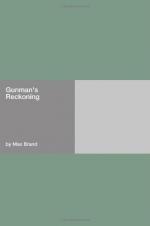A little lean-to against the main shack served as a stable; the creek down the hillside was the watering trough. And Donnegan stood by while the big Negro silently tended to the horses—removing the packs and preparing them for the night. Still in silence he produced a small lantern and lighted it. It showed his face for the first time—the skin ebony black and polished over the cheekbones, but the rest of the face almost handsome, except that the slight flare of his nostrils gave him a cast of inhuman ferocity. And the fierceness was given point by a pair of arms of gorilla length; broad shoulders padded with rolling muscles, and the neck of a bull. On the whole, Donnegan, a connoisseur of fighting men, had never seen such promise of strength.
At his gesture, George led the way into the house. It was more commodious than most of the shacks of The Corner. In place of a single room this had two compartments—one for the kitchen and another for the living room. In vacating the hut, the last occupants had left some of the furnishings behind them. There was a mirror, for instance, in the corner; and beneath the mirror a cheap table in whose open drawer appeared a tumble of papers. Donnegan dropped the heavy sack of Godwin’s winnings to the floor, and while George hung the lantern on a nail on the wall, Donnegan crossed to the table and appeared to run through the papers.
He was humming carelessly while he did it, but all the time he watched with catlike intensity the reflection of George in the mirror above him. He saw—rather dimly, for the cheap glass showed all its images in waves—that George turned abruptly after hanging up the lantern, paused, and then whipped a hand into his coat pocket and out again.
Donnegan leaped lightly to one side, and the knife, hissing past his head, buried itself in the wall, and its vibrations set up a vicious humming. As for Donnegan, the leap that carried him to one side whirled him about also; he faced the big man, who was now crouched in the very act of following the knife cast with the lunge of his powerful body. There was no weapon in Donnegan’s hand, and yet George hesitated, balanced—and then slowly drew himself erect.
He was puzzled. An outburst of oaths, the flash of a gun, and he would have been at home in the brawl, but the silence, the smile of Donnegan and the steady glance were too much for him. He moistened his lips, and yet he could not speak. And Donnegan knew that what paralyzed George was the manner in which he had received warning. Evidently the simple explanation of the mirror did not occur to the fellow; and the whole incident took on supernatural colorings. A phrase of explanation and Donnegan would become again an ordinary human being; but while the small link was a mystery the brain and body of George were numb. It was necessary above all to continue inexplicable. Donnegan, turning, drew the knife from the wall with a jerk. Half the length of the keen blade had sunk into the wood—a mute tribute to the force and speed of George’s hand—and now Donnegan took the bright little weapon by the point and gave it back to the other.




